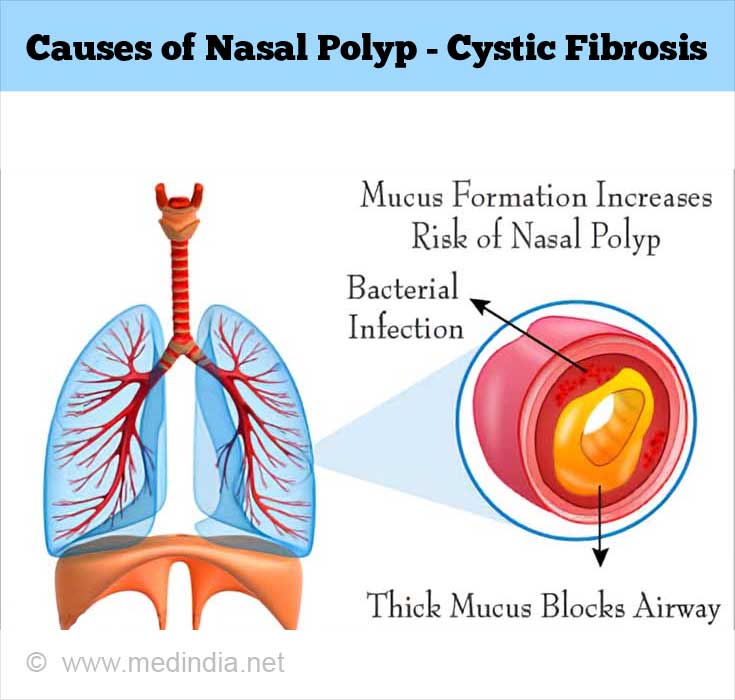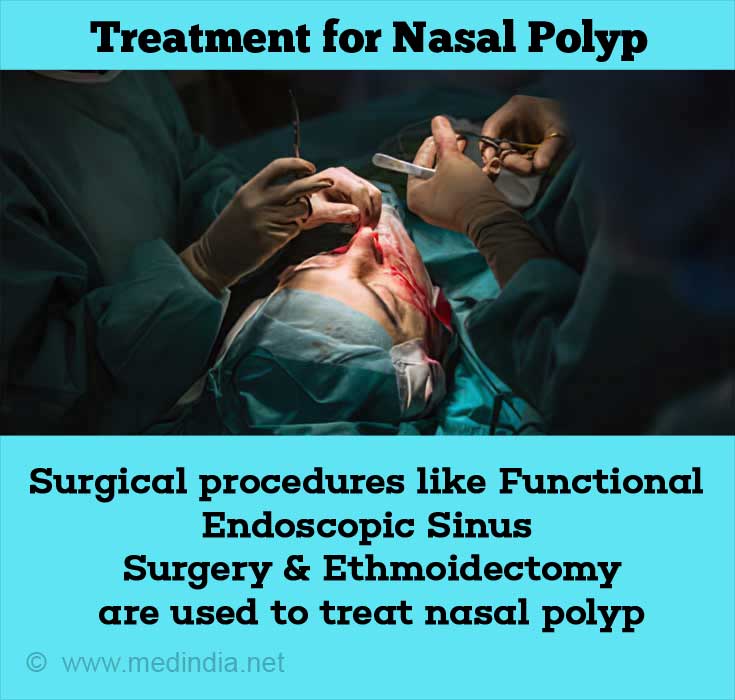- Nasal Polyps - (https://www.health.harvard.edu/a_to_z/nasal-polyps-a-to-z )
- All About Nasal Polyps - (https://www.medicalnewstoday.com/articles/177020.php#symptoms)
- Nasal Polyps - Symptoms & Causes - (https://www.mayoclinic.org/diseases-conditions/nasal-polyps/symptoms-causes/syc-20351888 )
- What are Nasal Polyps? - (https://www.healthline.com/health/nasal-polyps#causes )
- Overview of Nasal Polyp - (https://en.wikipedia.org/wiki/nasal_polyp#types)
- Nasal Polyps - Symptoms & Causes - (https://www.mayoclinic.org/diseases-conditions/nasal-polyps/symptoms-causes/syc-20351888 )
What is Nasal Polyp?
A nasal polyp is a non-cancerous outpouching of the mucous membrane of the paranasal sinus into the nasal cavity. It produces symptoms like feeling of obstruction, changes in voice etc. and may require surgical removal.
The inner lining of the nose consists of a layer of mucus membrane. The lining extends into the paranasal sinuses, which are hollows in the facial bones surrounding the nose that open into the nose. The maxillary sinuses are located in the cheekbones, the frontal sinuses in the forehead bone close to the nose, the ethmoid sinus in a bone between the eyes, and the sphenoid sinus just behind it. Infection of the sinuses is called sinusitis, which is a common condition affecting several individuals.(1✔ ✔Trusted Source
Nasal Polyps
Go to source)
Nasal polyps occur when the mucus membrane from the sinuses protrude into the nose through the sinus openings. They are of two types:
- Antrochoanal polyps: These polyps originate from the maxillary sinus and grow towards the posterior part of the nose. They affect children more often.
- Ethmoidal polyps: These polyps arise from the ethmoidal sinuses and grow towards the anterior part of the nose. They occur more commonly in adults.(2✔ ✔Trusted Source
Overview of Nasal Polyp
Go to source)
What are the Causes of Nasal Polyp?
The exact cause of nasal polyp is not known. Patients with nasal polyps usually have a condition called chronic rhinosinusitis, an inflammation of the nose and paranasal sinuses for at least 3 months. Some of the suggested causes of nasal polyp are:
- Infection of the mucous membrane lining, which usually results in antrochoanal polyps
- Allergy or other causes, which results in ethmoidal polyps
Several conditions increase the chances of developing nasal polyp. These include:
- Allergic conditions like asthma including aspirin-induced asthma, and allergic rhinitis
- Cystic fibrosis, a genetic condition where the glands of the skin, mucus membranes and digestive tract produce thick mucus

- Kartagener’s syndrome, a genetic syndrome where there is a defect in the hair-like projections of the mucosal cells called cilia
- Young’s syndrome, another genetic condition associated with thick mucus
- Churg-Strauss syndrome, an autoimmune condition which affects small blood vessels(3Nasal Polyps - Symptoms & Causes
Go to source)
What are the Symptoms and Signs of Nasal Polyp?
Symptoms and signs of nasal polyps include the following:
- Painless mass in the nose
- The mass is usually single in antrochoanal polyp or multiple in ethmoidal polyps
- It may be present on one or both sides of the nose.
- It may hang with a stalk or peduncle towards the outer opening of the nose or towards the throat
- It usually does not bleed on touch
- Feeling of stuffiness or obstruction in the nose
- Change in voice
- Headache
- Symptoms of allergies like sneezing, watering of nose, itching
- Symptoms of infection like yellowish discharge
- The nose may be broader than normal(4What are Nasal Polyps?
Go to source)

How is Nasal Polyp Diagnosed?
Diagnosis of nasal polyp is based on physical examination with a rhinoscope.
Imaging tests like CT scan or MRI scan are commonly used in the diagnosis of the nasal polyp and to study its extent. Tests for suspected underlying conditions like cystic fibrosis should also be done. Allergy tests may help to detect underlying allergy.
How Do You Treat Nasal Polyp?
Treatment of nasal polyp involves medications or surgery.
Medications: Anti-allergy medications may help to treat nasal polyp in the early stages. Ethmoidal polyps respond well to medications. Steroid nasal sprays and antihistaminic medications are used, which help to control the allergy and thereby treat the polyp. Antibiotics may be used to treat the infection.
Surgery: Nasal polyps may be removed through surgery under general or local anesthesia. Procedures that are commonly used to remove nasal polyps include the following:
- Functional Endoscopic Sinus Surgery: In this procedure, a tube-like instrument is introduced into the sinuses. A snare is introduced through the tube around the polyp, which removes it.
- Ethmoidectomy: During this surgical procedure, the partitions between the ethmoid sinuses and the polyps are removed. The approach to this surgery can be either through the nose or external.(5All About Nasal Polyps
Go to source)

Health Tips
- Treat any condition that could cause nasal polyps
- Since nasal polyps can recur, a nasal examination is advised at regular intervals










